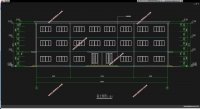三层2484平米厦门某大学钢结构教学楼设计(含建筑图结构图)(设计计算书22000字,CAD建筑图8张,CAD结构图10张)
摘要
本工程位于厦门市。主体结构总层数为三层,层高为3.9m。建筑总高度为13m,建筑平面尺寸为36m×23 m,建筑面积为2484.26cm2 。基本风压为0.8km/m2 ,抗震设防烈度为 7度,基本地震加速度为 0.15g。功能上满足老师同学教与学的使用要求,能够充分的利用有限的空间使布局更加合理。
本设计贯彻“实用、安全、经济、美观”的设计原则。按照建筑设计规范,认真考虑影响设计的各项因素。根据结构与建筑的总体与细部的关系。
整个结构在设计过程中,严格遵循相关的专业规范要求,结构主体为钢框架结构,由箱型钢柱和H型钢梁构成框架体系。节点的拼接采用栓焊混合连接。楼屋面采用压型钢板-钢筋混凝土非组合楼板,墙体为轻质加气混凝土板。楼梯设计为钢梯,基础为柱下独立基础。结构设计考虑到了结构的抗震性能,在有关地震效应计算时,主要参考国家现行规范。结构的计算的主要内容依次如下:PKPM软件计算初步选取构件尺寸,荷载的计算,内力的计算,构件的验算,构件的连接设计,柱下独立基础的设计。其中内力考虑了风荷载、地震荷载、雪荷载等多种荷载,构件和节点的验算均考虑了有震及无震两种情况。
通过毕业设计,综合应用四年的所学的专业知识,使我的专业水平得到很大提高,为将来的工作打下了坚实的基础。
关键词:钢框架结构、节点设计、钢构件设计
Abstract
The project is located in Xiamen city. The main structure of three floors in total,story is 3.9m. The total building height of 13m, the construction plane size is 36m×23 m, construction area of 2484.26cm2. The basic wind pressure is 0.8km/m2,the seismic intensity of 7 degrees, 0.15g basic seismic acceleration. Function to meet the teachers and students in teaching and learning requirements, can make full use of limited space layout more reasonable.
The design principle of "practical, safe, economic, beautiful" design. According to the architectural design standard, carefully consider the various factors influence the design. According to the relationship between structural and architectural detail and the overall.
The entire structure in the design process, strictly abide by the professional norms related requirements, the main structure is the steel frame structure,composed of a box type steel column and H beam frame system. Nodes with bolted and welded connection joint. Floor roof of the profiled steel sheet - reinforced concrete non composite slab, wall for lightweight concrete. Staircase design as ladders, basis for independent foundation under column. Structural design considering the seismic performance of the structure, calculation on seismic effect, mainly referring to the current national norms. The main contents are as follows: the structure calculation of the preliminary selection of PKPM software component size calculation, load calculation, internal force calculation,member checking, design of connection components, design of the independent foundation under column. The internal forces considering wind load, seismic load, snow load and other loads, checking component and node are considered the earthquake and non earthquake in two cases.
Through the graduation design, comprehensive application of four years of professional knowledge, make my professional level has been greatly improved,and lay a solid foundation for future work.
Keywords: steel structure, node design, steel frame design
1.1 工程概况
该工程为厦门某大学2#教学楼,总层数为3层,层高3.9 m,平面尺寸为36m×23m。总建筑面积约为1404㎡。建筑结构形式为钢框架结构,基础采用钢筋混凝土独立基础。
1.2 建筑结构等级指标及设计年限
1、建筑结构安全等级:二级;
2、结构设计使用年限:50 年;
3、建筑抗震设防等级:丙类;
4、地基基础设计等级:丙级。
1.3 建筑设计相关参数
1、基本风压:0.8 kN/㎡
2、地面粗糙类型:C类;
3、基本雪压:无
4、场地类别:Ⅱ类;
5、抗震设防烈度:7 度;
6、设计基本地震加速度:0.15g
7、设计地震分组:第一 组;
8、建筑耐火等级:二级;
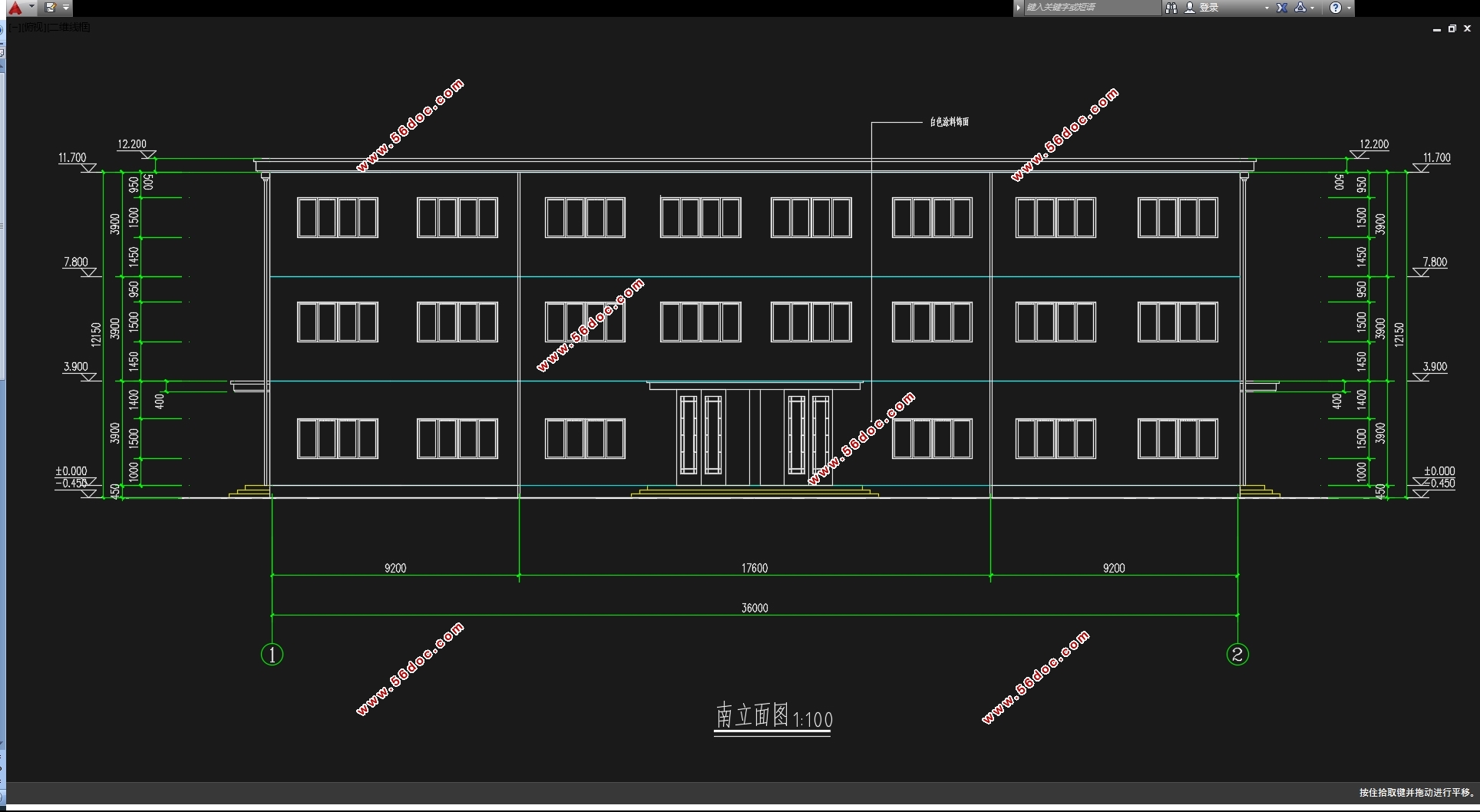
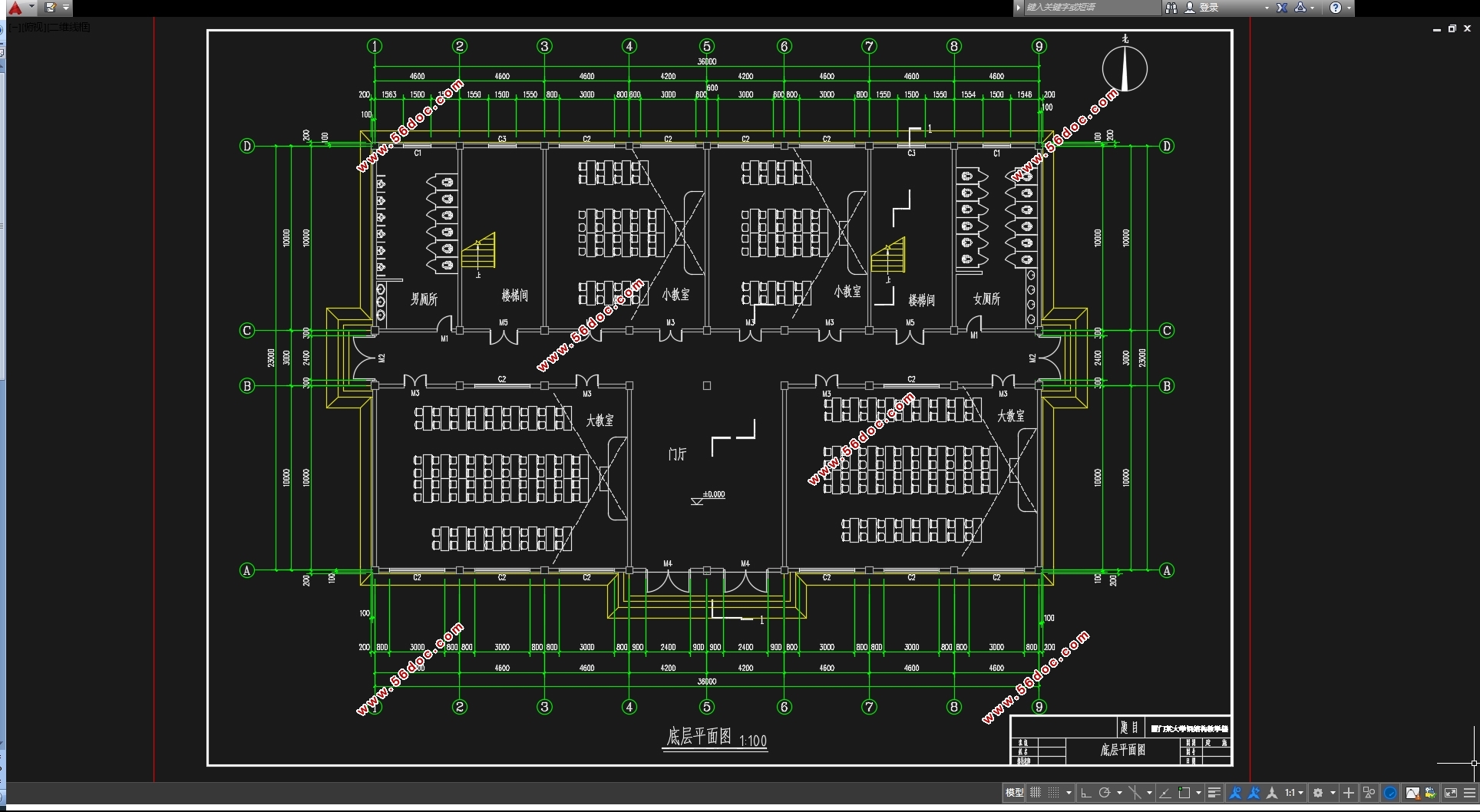
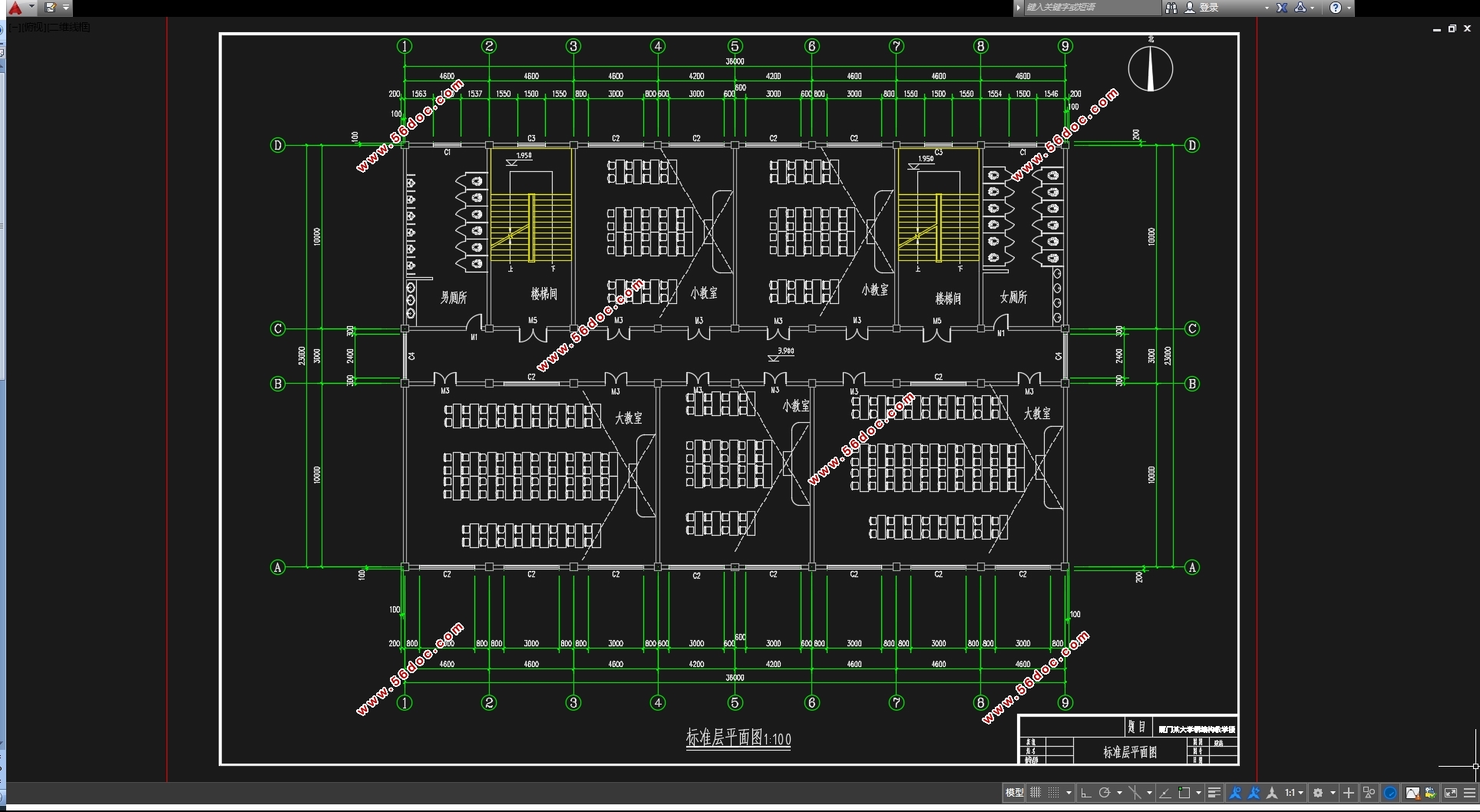
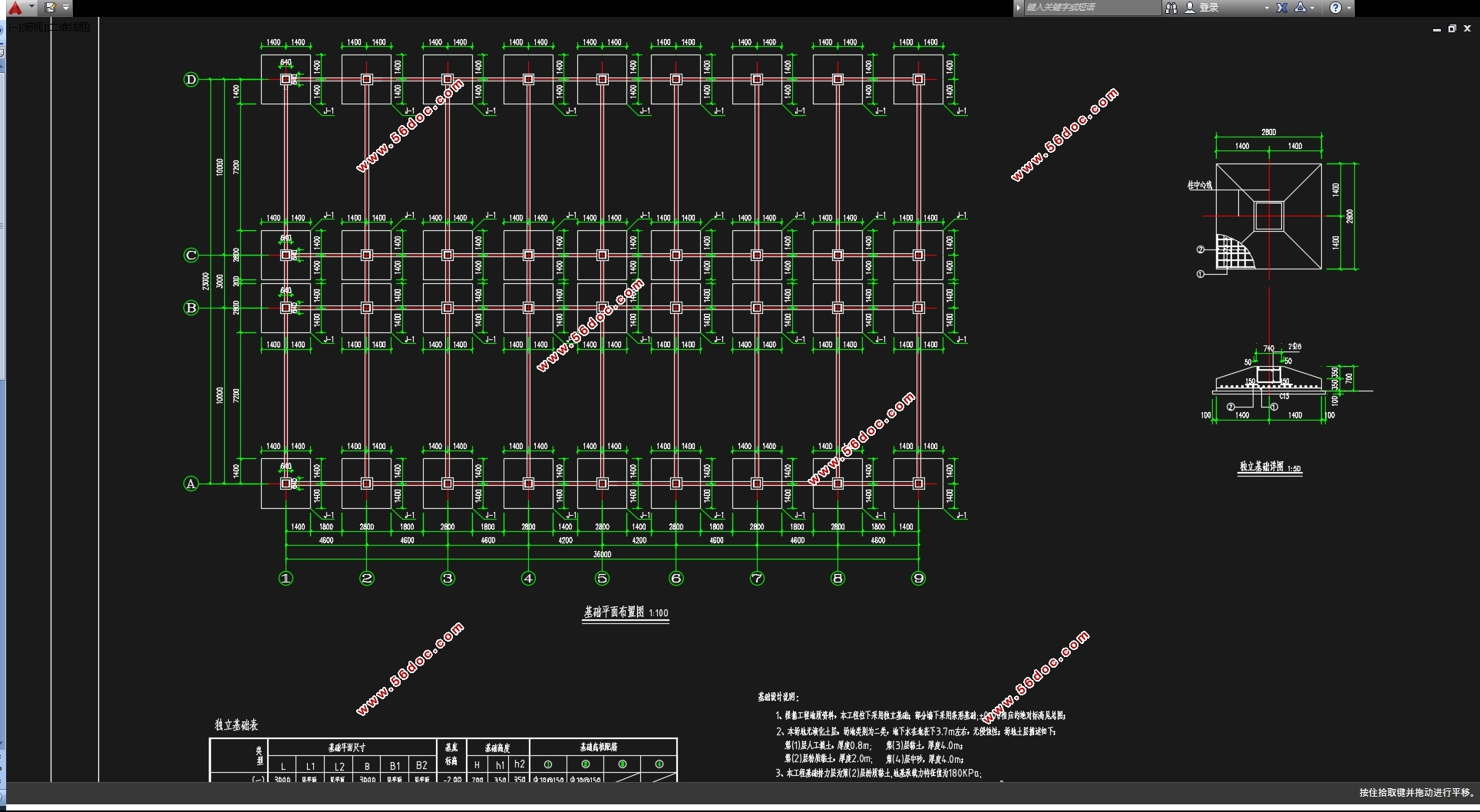
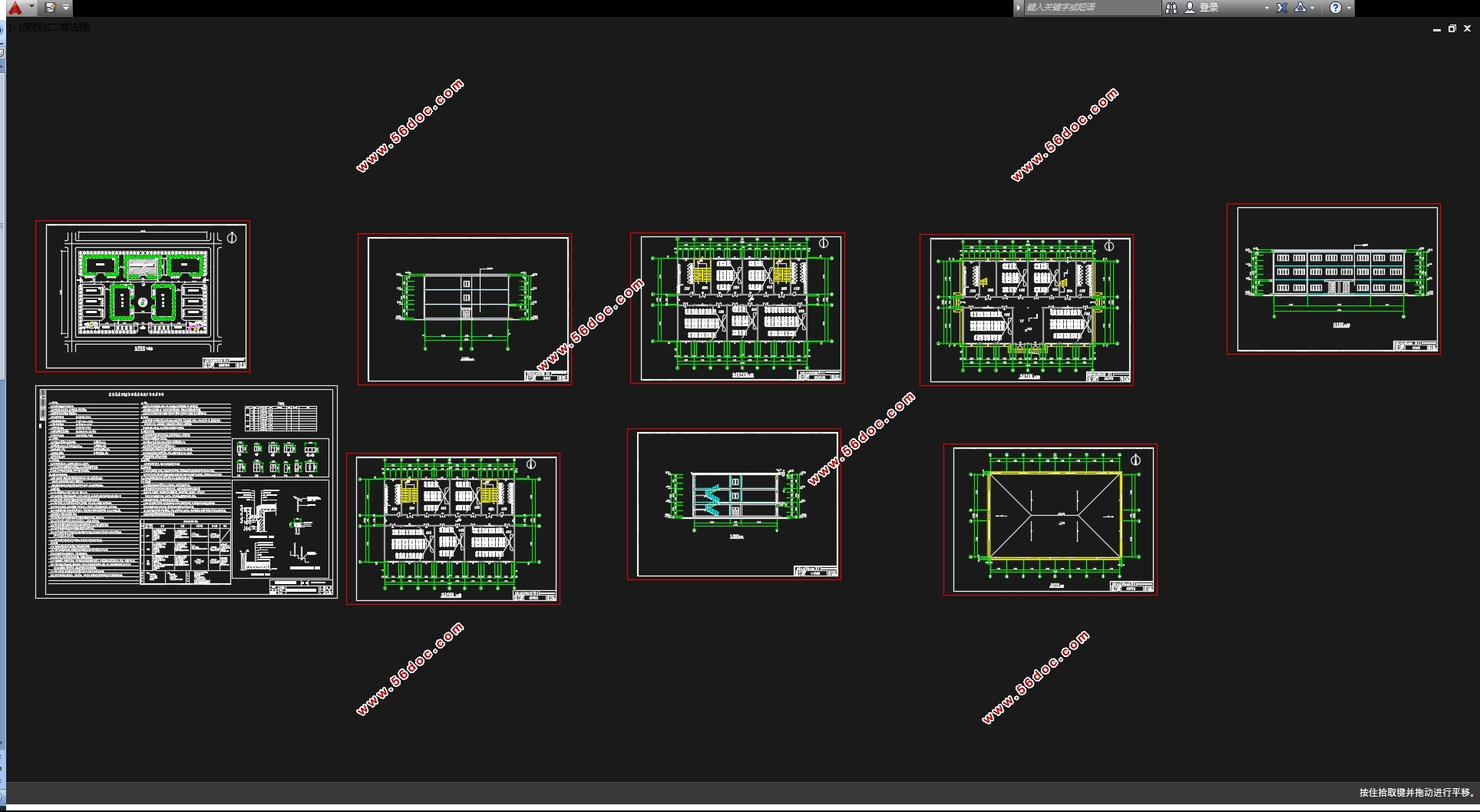
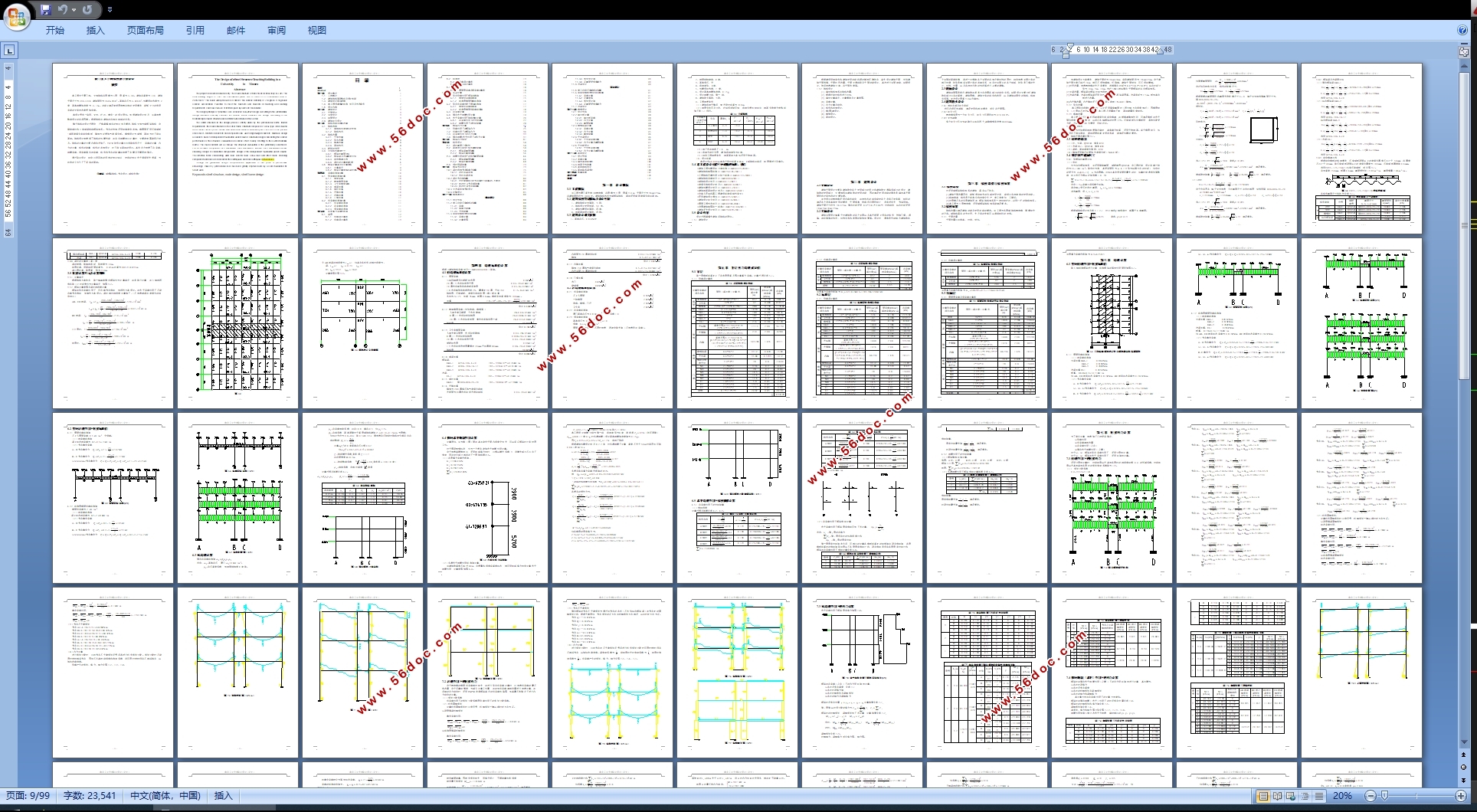

目 录
摘要 Ⅰ
Abstract Ⅱ
第一章 设计概况 1
1.1 工程概况 1
1.2 建筑结构等级指标及设计年限 1
1.3 建筑设计相关参数 1
1.4 本工程所遵循的标准,规范及技术条件 2
1.5 设计内容 2
第二章 建筑设计 3
2.1 平面设计 3
2.2 立面设计 3
2.3 剖面设计 3
2.4 建筑防火设计 3
第三章 结构选型与结构布置 4
3.1 结构选型 4
3.1.1 钢结构比混凝土的优势 4
3.1.2 结构形式 4
3.2 结构布置 4
3.2.1 平面布置 4
3.2.2 竖向布置 4
3.2.3 楼盖布置 4
3.2.4 基础形式 4
3.3 材料的选用 5
3.4 初估构件截面尺寸 5
3.4.1 框架柱截面初估 5
3.4.2 框架梁及次梁截面初估 6
3.4.3 组合楼盖初选 6
3.4.4 梁柱的计算跨(高)度 6
3.5 框架计算单元及计算简图 7
3.5.1 计算单元 9
3.5.2 框架计算简图及梁柱线刚度计算 9
第四章 荷载标准值计算 10
4.1 恒荷载标准值计算 10
4.1.1 屋面荷载 10
4.1.2 教室楼面荷载 10
4.1.3 卫生间楼面荷载 10
4.1.4 钢梁自重 10
4.1.5 钢柱自重 10
4.1.6 外墙自重 10
4.1.7 内墙自重 10
4.1.8 门窗自重 11
4.2 活荷载标准值计算 11
4.2.1 活荷载标准值 11
4.2.2 风荷载标准值 11
4.2.3 雪荷载标准值 11
第五章 各层重力荷载代表值 12
5.1 首层 12
5.1.1 恒载项计算表 12
5.1.2 活载项计算表 13
5.2 标准层 13
5.2.1 恒载项计算表 13
5.2.2 活载项计算表 14
5.3 屋面层 14
5.3.1 屋面层荷载及雪荷载计算表 14
第六章 荷载计算 15
6.1 竖向恒载作用下框架标准值 15
6.1.1 屋面恒荷载标准值 15
6.1.2 标准层楼面恒载标准值 16
6.2 竖向活荷载作用下框架标准值 17
6.2.1 屋面活荷载标准值 17
6.2.2 标准层楼面活荷载标准值 18
6.3 风荷载计算 19
6.4 横向水平地震作用计算 19
6.5 水平荷载作用下结构侧移计算 20
6.5.1 风荷载作用下的位移验算 22
6.5.2 地震作用下的位移验算 24
第七章 框架内力计算 25
7.1 恒载作用下的框架内力 25
7.2 活载作用下的框架内力 30
7.3 风荷载作用下的内力计算 33
7.4 横向地震(水平)作用下的内力计算 37
第八章 框架内力组合 41
第九章 构件设计 54
9.1 梁柱截面几何特性 54
9.2 基本效应组合下构件截面验算 54
9.2.1 框架梁截面验算 54
9.2.2 框架柱截面验算 56
9.3 地震作用组合下的构件截面验算 66
9.3.1 框架梁截面验算 66
9.3.2 框架柱截面验算 68
9.4 强柱弱梁验算 73
第十章 框架节点设计 73
10.1 梁柱刚接节点承载力验算 75
10.1.1 边柱与梁连接 75
10.1.2 中柱与梁连接 77
10.2 梁柱节点域验算 80
10.2.1 对柱壁厚较小的节点域进行验算的三方要求 80
10.2.2 底边柱A节点域验算 81
10.2.3 底边柱B节点域验算 82
10.3 主次梁连接节点设计 83
10.4 柱脚设计 85
第十一章 楼屋盖设计 88
楼盖设计
11.1 设计资料 88
11.2 施工阶段压型钢板的验算 88
11.2.1 荷载 88
11.2.2 承载力验算 88
11.2.3 变形验算 89
11.3 非组合楼板使用阶段验算 89
11.3.1 荷载计算 89
11.3.2 计算简图 89
11.3.3 弯矩设计值 90
11.3.4 正截面受弯承载力 90
11.4 次梁设计 90
屋盖设计
11.5 施工阶段压型钢板的验算 91
11.6 非组合楼板使用阶段的验算 91
11.6.1 荷载计算 91
11.6.2 计算简图 91
11.6.3 弯矩设计值 92
11.6.4 正截面受弯承载力 92
11.7 次梁设计 93
第十二章 楼梯设计 94
12.1 设计资料 94
12.2 踏步板计算 94
12.2.1 踏步板荷载 94
12.2.2 内力计算 94
12.2.3 截面验算 94
12.3 楼梯斜梁计算 94
12.3.1 荷载计算 94
12.3.2 内力计算 95
12.3.3 截面验算 96
12.4 平台梁设计 96
12.4.1 平台梁荷载计算 96
12.4.2 内力计算及截面验算 97
12.5 平台板设计 97
12.5.1 平台板荷载计算 97
12.5.2 内力计算及截面验算 97
第十三章 基础设计 98
13.1 设计资料 99
13.2 荷载计算 100
13.3 确定基础底面积 100
13.4 地基变形验算 101
13.5 基础结构设计 101
13.6 基础联系梁设计 104
第十四章 电算结果 107
参考文献 120
致谢 121
|
